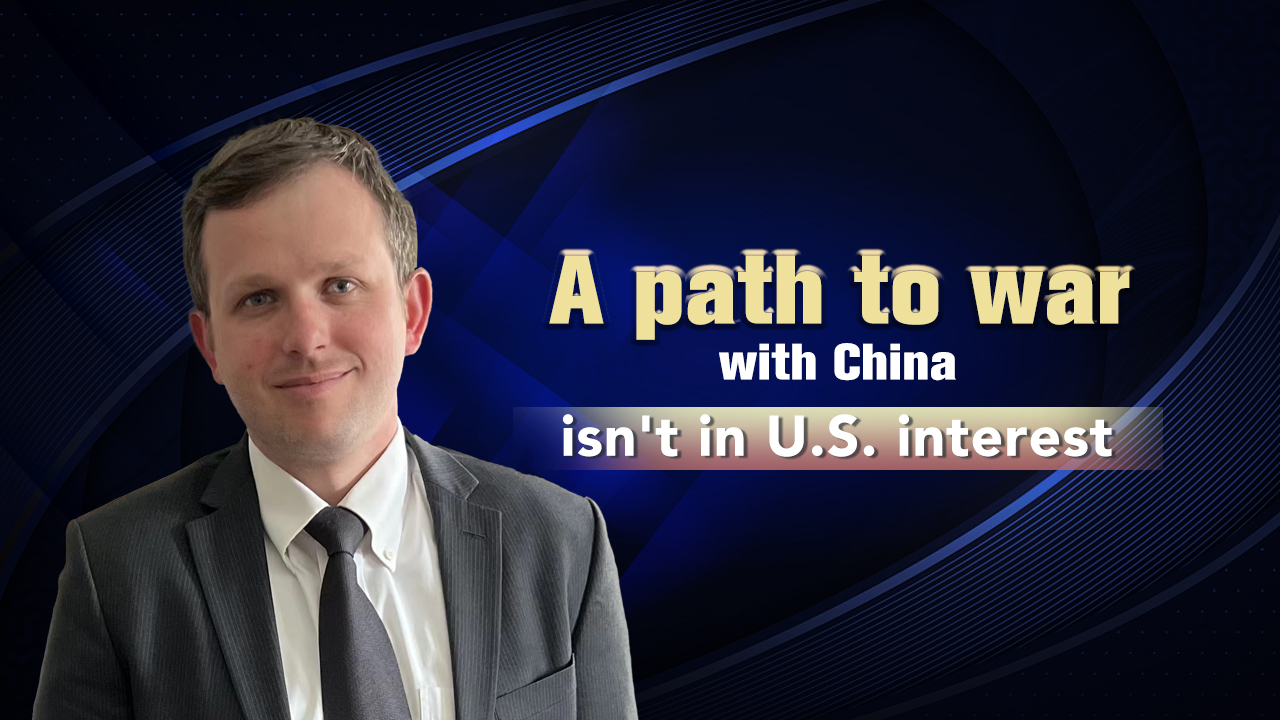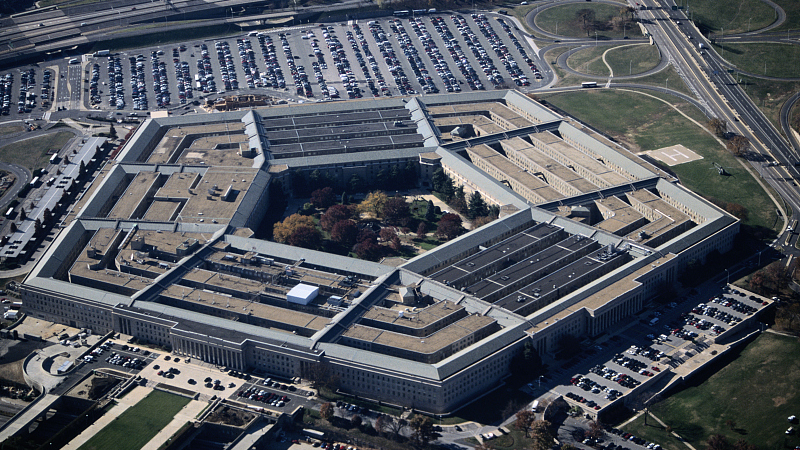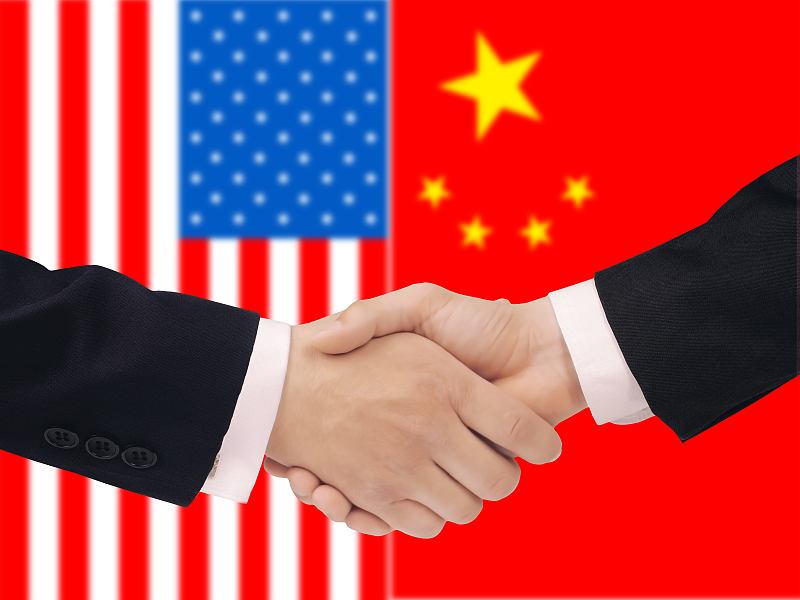04:33

Editor's note: Abhishek G Bhaya is a senior journalist and international affairs commentator. The article reflects the author's opinions and not necessarily the views of CGTN.
The U.S. seems to be driving a dangerous policy of constant provocation against China vis-à-vis its recent trend of enhancing trade and political ties with the Taiwan region, in complete disregard of the one-China principle, attracting a rebuke from Beijing and also prompting fears of a looming war between the world's two most powerful nations.
And guess what, the U.S. is going about it without any "strategic ambiguity" whatsoever. Just days after the much-talked-about irresponsible and reckless visit of U.S. House Speaker Nancy Pelosi to Taiwan, another U.S. Congressional delegation led by Senator Ed Markey made a contentious trip to the island region last Sunday.
Subsequently on Wednesday, in yet another act that undermines the one-China principle, the office of the United States Trade Representative (USTR) announced that the U.S. will start formal talks on trade and economic initiatives with the Taiwan region, the first round of which is expected to take place in early fall this year.
Reacting to the latest provocation, Chinese Foreign Ministry Spokesperson Wang Wenbin on Thursday reiterated Beijing's position that China is always against any country negotiating agreements of sovereign implication or official nature with China's Taiwan region. "We ask the U.S. to follow the one-China principle and the provisions of the three China-U.S. joint communiqués with concrete actions, stop all forms of official interaction with Taiwan," he said.
"The U.S. must not negotiate agreements with the sovereign implication or official nature with China's Taiwan region or send any wrong signal to the 'Taiwan independence' separatist forces in the name of trade and economic interactions," Wang warned, adding that "China will act resolutely to defend its sovereignty and territorial integrity. We urge the U.S. not to miscalculate on this."
'Self-fulfilling prophecy'
Recent provocations on Taiwan aside, the U.S. seems to be preparing itself for an all-out political, economic and military conflict with China, and this has alarmed a large section of the civil society within the U.S. Saner and peace-loving American citizens and activists are increasingly raising their voices against the U.S. policy of provocation and escalation against China, and trying to convince Washington that a path to war is not in its own interest.

In July, the U.S. House of Representatives authorized an increase of the Pentagon budget to $839 billion. The $67-billion increase in war spending is more than the entire U.S. budget to fight climate change which stands at $44.9 billion. /CFP
In July, the U.S. House of Representatives authorized an increase of the Pentagon budget to $839 billion. The $67-billion increase in war spending is more than the entire U.S. budget to fight climate change which stands at $44.9 billion. /CFP
Related story:
China isn't a threat to American people: Veteran U.S. peace activist
"We have just seen the House of Representatives, which Nancy Pelosi leads as Speaker, authorize a $67 billion increase in the United States military budget which is already by far the most expensive military in the entire world," Brian Garvey, assistant director of Massachusetts Peace Action (MAPA), said, referring to the authorization of an increase in Pentagon budget to $839 billion in the last week of July. The $67-billion increase in war spending is more than the entire U.S. budget to fight climate change which stands at $44.9 billion, and also over and above the $37 billion that U.S. President Joe Biden had requested.
Garvey said that each dollar of the increase could be spent instead on fighting climate change, providing better healthcare, building good infrastructure, and investing in the education system in the U.S. "As long as we remain on a path to war with China, we cannot make the necessary investments that we need here in our own country. If we are going to invest in preventing future pandemics and preventing a climate catastrophe, we cannot be putting massive resources into preparing for war with China," he told CGTN.
Describing the conspicuously high spending in the military as a "self-fulfilling prophecy," Garvey warned that "if we endlessly prepare and put hundreds of billions and trillions of dollars for years into preparing for a war with China, that only makes that war more likely."
Conflict is the last thing we want
The young peace activist condemned Pelosi's recent visit saying it raises the specter of a new Cold War that the world doesn't need. "I think this is exactly the wrong time for this trip that Speaker Pelosi just made, because of… the war in Ukraine right now, the threat of a new Cold War that could have consequences for generations in the future."
Garvey felt that a world already facing several challenges could do without a conflict in yet another region. "Conflict in the Pacific… when right now, we're dealing with the fallout from another diplomatic failure that led to the war in Ukraine. This is absolutely the last thing that we need."
He also lamented that as a direct consequence of Pelosi's provocative misadventure, China and U.S. are unlikely to cooperate actively in fighting crucial global challenges, such as the threat of climate catastrophe, transnational crime, the threat of global pandemics, which he described as the "shared enemies" of humankind.
"Unfortunately, we're already seeing some of the consequences. There's been now an announcement by the Chinese government that participation [on] fighting shared enemies… between the United States and China as a result of this trip is going to be less, if not cut entirely. We need to go in the exact opposite direction. These are things that threaten both China and the United States," said Garvey.
"In the 21st century, we need to act globally, we need to learn how to get America and China to cooperate if we have any chance to defeat the threats."
'Biden must differentiate himself from Trump era'

American peace activists call for better China-U.S. relations, stressing that direct talks between the top leadership remain the best way for reconciliation and avoiding confrontation. /CFP
American peace activists call for better China-U.S. relations, stressing that direct talks between the top leadership remain the best way for reconciliation and avoiding confrontation. /CFP
Related story:
American peace activists condemn Pelosi's Taiwan misadventure
Pelosi's Taiwan visit: Dangerous for all who are interested in peace
Despite spiraling China-U.S. tensions, anti-war voices within American civil society, such as Garvey's, still want better relations between the two countries. Garvey felt that direct talks between the top leadership of China and the U.S. remain the best way for reconciliation and avoiding confrontation.
"I would recommend, I know that this seems difficult at the moment, but direct and very public talks between the United States and China to stamp out this notion that we are on a path to inevitable war. This does not need to happen and is not in the interests of China. It is not in the interests of the United States," he said.
Garvey recommended that the ruling Democratic Party and the Biden administration put as much distance as possible between themselves and former President Donald Trump and his administration, which was known to be extremely hostile to China. "Some of that [Trump administration] rhetoric has led to anti-Asian racism and hate crimes here in the United States. That is the exact opposite of what we need here."
Looking at the current situation with some optimism, Garvey felt that it also offers the Democrats and President Biden a chance to differentiate themselves from the Trump era. "It is incredibly important, given the fact that House Speaker Nancy Pelosi just made this very provocative visit, the ball is in the court of the Biden administration and they should reach out directly to their counterparts in China and set up talks because negotiations and peace talks are what prevent war."
Text and interviewer: Abhishek G Bhaya
Video editor: Feng Ran
Cover image: Jia Jieqiong
Senior producers: Bi Jianlu, Wang Xinyan, Zhang Peijin
Chief editor: Li Shouen
Director: Ma Jing
(If you want to contribute and have specific expertise, please contact us at opinions@cgtn.com. Follow @thouse_opinions on Twitter to discover the latest commentaries on CGTN Opinion Section.)

